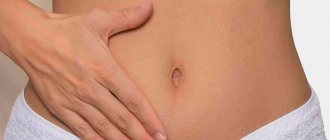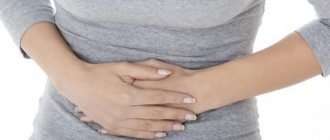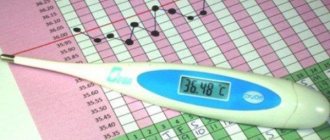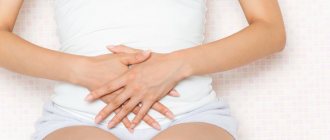Menstruation affects a woman’s mood depending on the phase of the cycle. The main reason for the deterioration of well-being and psycho-emotional state is physiological changes due to hormonal changes.
Premenstrual syndrome is often accompanied by nervousness, which appears against the background of neuropsychic and vegetative-vascular disorders. During critical days, girls become whiny and irritable. You can lift your spirits and provide psychological and emotional recovery using non-drug methods and medications.
Why and how do periods affect your mood?
The content of the article
Premenstrual syndrome or PMS is characterized by general malaise and nervousness - a woman begins to have a stomach ache, she may behave unusually. Unmotivated mood swings in women begin 6-7 days before the start of menstruation. Tearfulness gives way to apathy, tearfulness to aggression.
Loss of strength and depression during PMS appear against the background of the release of progesterone and estrogen (female hormones) into the blood. The main signs of premenstrual syndrome include slight weight gain and the appearance of pain in the chest area. A woman always wants to sleep, her taste preferences change. The influence of third-party factors - weather conditions, surroundings, everyday troubles - negatively affects a woman’s well-being.
The countdown of the initial phase of the menstrual cycle begins on the first day of the appearance of bleeding. Rejection of the epithelium saturated with blood by the uterus occurs if conception does not occur. Menstruation (phase 1) is accompanied by characteristic symptoms:
- pain in the lower abdomen;
- terrible mood;
- depression;
- drowsiness or insomnia.
The menstrual cycle lasts 3-5 days. During this period, the woman feels unwell, her psycho-emotional state is depressed, and her vitality is reduced. In the middle of the cycle, the psychological background levels out, the girl feels calmer. Discomfort and ailments disappear due to increased levels of testosterone and estrogen. Hormones provide performance, vigor and energy. The speed of reactions is restored.
At the end of this period, a new epithelial layer is formed that can receive the egg. After menstruation comes the next stage - ovulation, which lasts 1 day. The mood during ovulation gradually improves against the background of restoration of metabolic functions in the body. Hormone levels return to normal, physical activity is at its peak, the woman is not bothered by mood swings, irritability during ovulation is replaced by a positive attitude.
The luteal phase, lasting up to 14 days, is considered the final stage of the cycle. During this period, the body tries to accept a fertilized egg. When pregnancy occurs, a major restructuring of the body occurs, so it is necessary to mentally prepare for the upcoming birth in advance.
Women past reproductive age enter menopause. Menopause occurs as a result of a complex natural process in the body. Its symptoms are similar to those of premenstrual syndrome - hormone production decreases sharply. Responsible for good health:
- estrogen;
- serotonin;
- endorphin;
- progesterone.
Along with age-related changes, a woman becomes aware of the imminent approach of old age. The support of loved ones will help you overcome difficulties and level out your emotional background.
Main reasons
Experts have long found an explanation for a woman’s depressive state – changes in hormones. Before the onset of menstruation (21–28 days), the amount decreases sharply, and if you take the hormone orally, it still will not help.
Some scientists believe that depression is caused by:
- Emotional disorders.
- Seasonal disorders.
- Experienced stress.
Most often, depression is characteristic of neuropathic, hysterical women with an unstable psyche. Sometimes the cause of depression can be poor nutrition. If you change it, you can get rid of some unpleasant symptoms.
One very good psychotherapist was frustrated with his own behavior. A lady came to him and began to tell him that she was depressed before her period. And he goes ahead and tell the truth straight to the face... That’s what he said, that this is not depression, but natural changes before menstruation, and she just needs to develop the right pattern of behavior on such days. But the truth in this matter is expensive. The woman was offended and left slamming the door. So what? And the old woman gets into trouble. Next time he will be smarter and will not offend patients with such actions. If someone really wants it to be called the word “depression,” then why deny this pleasure?
The truth is that when making a diagnosis in the medical sense, and not in the colloquial sense, premenstrual syndrome is excluded, not included. True, symptoms similar to those that occur with depression are not so common in women. It’s not even clear why and who started trying to link all this to depression.
Depression before menstruation is a fairly common phenomenon among women.
Usually, “depression” during and before menstruation in women looks completely different. This is reminiscent of the definition of love through a steam locomotive.
- Vasya, what is love?
- Well, how can I tell you, Katya... Do you know what a steam locomotive looks like?
- Of course I know…
- So here it is. It doesn't look like love at all.
Before menstruation, women become nervous, sometimes aggressive, prone to sudden emotional swings, tearfulness occurs, but not as much as during depression. According to statistics, at this time, weather dependence increases, and there may be headaches and abdominal pain. Sleep is disturbed, but you never know when it is disturbed. It is also disrupted during toothache. If a woman is prone to alcoholism, she may drink more than usual or smoke more often than usual. The attitude towards food changes. Favorite dishes stop making you happy, and you want something else.
It's no secret that women become more agitated and aggressive before their periods.
During the period from the 21st to the 28th day of the menstrual cycle, the level of estrogen hormones sharply decreases. Attempts to compensate for this by artificially increasing the amount of hormones lead nowhere. Nutritionists even recommend the opposite strategy - you need to eat more foods that prevent their accumulation and activate metabolism. This is a food that is rich in calcium and magnesium. Sometimes vitamins A, E, B6 are prescribed. But they try not to prescribe some drugs specifically from those that are used in terms of psychotherapy until the last minute. It is highly discouraged to self-medicate and take tranquilizers or antidepressants just because you believe that you are depressed during your period. This is anything, but not depression and nothing needs to be treated. Among the criteria for depressive disorder, you may have a couple of similar symptoms. But this doesn't mean anything. People with severe toothache may have even more symptoms of depression. But then dentists will help... But it is useless to fight the natural structure of the female body.
Another thing is psychotherapy, especially in the form of self-help. The arsenal here is quite wide...
In all cases, when it comes to mental disorders, we strongly do not recommend introducing strangers to this. All this can be told to specialists or participants in psychological groups. As a last resort, for those who once suffered something similar. Others simply won't understand. In the case of PMS, depression is not real, so feel free to share your experiences with your friends.
Depression occurs due to abdominal pain, increased fatigue, and constant nervous tension.
How to cope with irritability and depression during periods?
Depending on the cycle, many factors influence a woman’s mood. You can deal with terrible health and bad mood in several ways. Planning a pregnancy and keeping a diary in which it is necessary to note menstruation and ovulation simplifies the situation and helps the woman prepare for possible consequences.
Unusual behavior, irritation and depression are controlled with medication. If the mood regularly deteriorates, a woman constantly wants to cry, then sedatives (calming) drugs can help. These include:
- Relaxil. The drug has a beneficial effect on the nervous system. Regular use of the drug helps relieve nervousness and overcome feelings of fatigue.
- Sedavit. It is used in the treatment of emotional disorders due to hormonal imbalance. The medicine is enriched with vitamins.
- Peony infusion. The medicine, which contains a plant extract of peony, alleviates PMS and helps get rid of feelings of anxiety and fear.
Sedatives should not be combined. They must be drunk twice a day at the same time. The daily dose of sedatives is 1 tablet once. Exceeding the therapeutic dose increases the risk of side effects, including impaired coordination and confusion.
Analgesics will help relieve pain and reduce the severity of characteristic symptoms during menstruation. The following drugs are approved for use during PMS and menstruation:
- Analgin. Quickly penetrates soft tissue and reaches the source of pain. The effect is noticeable 15-20 minutes after taking the tablet. Has antispasmodic properties.
- No-shpa. Relieves even severe pain. The antispasmodic relaxes muscle fibers. The active component prevents uterine contractions.
- Ketolong. The drug is injected intramuscularly. A targeted medicine eliminates pain and relieves muscle spasms.
According to the instructions, relief occurs 20 minutes after taking the medication. Analgesics have contraindications, in the presence of which the use of the above-described drugs is prohibited.
In winter, depression during menstruation is due to seasonality and weather conditions. Affective disorders (changes in the emotional background) are characterized by fatigue, weakness and absent-mindedness. The mood changes for the worse, the woman is depressed. To restore psychological balance, different methods are used:
- yoga;
- massage;
- finding new hobbies.
Some yoga poses (vrikshasana, tadasana) help to relax and relieve tension. If your period is accompanied by pain, you can get a massage. No special skills are required for this; just stroke your belly clockwise. There are points on the earlobes that when massaged make you feel better. A new hobby will help take your mind off sad thoughts.
Proper balanced nutrition reduces the volume of secretions and reduces the risk of developing cramps. It is necessary to remove foods that have a stimulating effect on the central nervous system from the diet.
What would a disorder look like?
And in the end, a little about how to distinguish the usual state before menstruation from an affective type mental disorder. Depression in the medical sense is detected by a number of criteria. One of them is the lack of identity in words and facial expressions. A sick person may be sad and tearful, but his face remains stony, like a mask. He may experience wild and inexplicable anxiety, which he feels as a lump in the area in front of his heart. He thinks negatively and sees no prospects in life. He not only loses the ability to concentrate on something, but falls into the realm of the psychological absence of things.
As if there was a white fog or a wall in the mind. Not only is his sleep disrupted, but the nature of his sleep phases changes. He falls somewhere and doesn't sleep. He cannot rest and this cannot be called being awake. The patient tends to solve all problems in an inappropriate way. In many ways, mental disorder causes dependence on itself in patients themselves.
In principle, during a depressive episode, a person may at some point be happy about something. But then, as if out of obligation, he will again return to his melancholy. Joy causes the manifestation of withdrawal syndrome. How is this possible? And suddenly I’m without melancholy?
Agree, all this is not at all like you. So don't call it depression. It would never occur to anyone to mention schizophrenia before menstruation. Why do you all love this word “depression” so much? There is nothing good about her. So don’t look for it in yourself just because you are a woman, and women experience PMS.
Sometimes you can get rid of depression fairly quickly by trying to ignore the symptoms of the disorder.
Now you understand why the psychotherapist from the beginning of this story began to deny the presence of depression in that lady. She didn’t like this... We hope that you will be more savvy and will not look for signs of a psychic chimera in yourself.
Most women experience depression in the run-up to menstruation.
This is expressed in emotional breakdowns, loss of internal control, unpredictable tantrums for no apparent reason, and increased suspiciousness.
A woman is easily irritated, tears or hysterical laughter are typical these days.
Driving a car can lead to accidents on the roads due to increased excitability and loss of attention.
How to stop negative signs caused by depression before menstruation? Are there effective methods?
List of prohibited products
| Group | Name | Rejection reason |
| Canned food | cucumbers Salads Fish and meat | Retain fluid in the body, increase pain |
| Nuts | Walnuts Earthen Cashew | Causes excess gas formation |
| Sweets and desserts | Ice cream Confectionery | Baking Sugar contained in foods causes irritability and drowsiness |
| Fast food | Potato chips Crackers Fast food | Large amounts of animal fats have a stimulating effect on the nervous system |
During menstruation, drinking alcohol is strictly prohibited. Alcohol dilates blood vessels; after a short-term euphoria, a phase of repentance begins. Discomfort and guilt aggravate the situation - the woman becomes irritable and aggressive.
What is depression before menstruation?
The female body is subject to monthly changes, when the hormonal, mental and vegetative-vascular systems are rebuilt. These changes have cycles. This is why a woman feels balanced and calm after menstruation, but 2-14 days before their onset she feels as if she is not herself. What is depression before menstruation? This is a condition that is characterized by all depressive symptoms in the period before the onset of menstruation.
Many women, before the onset of monthly bleeding, seem to be unable to control themselves. They become whiny, suspicious, touchy, irritable, aggressive, etc. Doctors note that during PMS a woman becomes a little crazy, unbalanced, and restless. To a greater extent, this does not depend on the woman herself. She is simply subject to those hormonal changes that are inherent in her by nature before menstruation.
During this period, the woman becomes weak. Some turn to psychologists for help, others try to cope on their own by using folk remedies... We are not talking about a painful condition. It’s just that women sometimes need support, attention and love from others.
Psychologists note that a woman’s condition before her period largely depends on her lifestyle, as well as her nervous system. Women become more susceptible to emotional changes, for example, neuropathic or hysterical. If on ordinary days a woman is balanced, then she is less susceptible to serious changes.
During the period of depression before menstruation, it can be observed that a woman’s appetite increases, her need to consume alcohol and even drugs, if on other days she suffers from these addictions.
This period becomes dangerous because women do not have much control over their actions. It is during PMS that women commit suicide, harm others, accidents occur, etc.
Patient reviews
Patient reviews of drug treatment for pain in different phases of the menstrual cycle are most often positive:
Svetlana Zarechnaya, 36 years old, Ekaterinburg
Menstruation is always very painful. I don’t even want to talk about mood swings - I get angry with my children, yell at my husband, and am constantly dissatisfied with everything. I realized that it was time to change. I consulted with my doctor. He prescribed mild analgesics and sedatives: valerian extract and Paracetamol. I started taking medications 5-6 days before my period. I am satisfied with the result - I began to react more calmly to stimuli, my sleep returned to normal, and my aggression disappeared.
Oksana Korovina, 29 years old, Samara
Before the start of the menstrual cycle, I constantly quarrel with my husband; he is dissatisfied with my tearfulness. I found salvation in yoga. A few asanas and the negativity goes away. I try to eat healthy and remove junk food from my diet. I only take medications for severe pain.
ONLINE REGISTRATION at the DIANA clinic
You can sign up by calling the toll-free phone number 8-800-707-15-60 or filling out the contact form. In this case, we will contact you ourselves.
If you find an error, please select a piece of text and press Ctrl+Enter
Causes of bad mood during PMS
Depression during PMS is quite common. However, it is also impossible to completely ignore a psychological disorder or, conversely, to run to the doctor at the first symptoms. It is necessary to understand the reasons for poor health and try to eliminate them. Perhaps the menstrual cycle has nothing to do with it.
Keeping a daily diary for at least three months will help you understand the problem. In principle, a diary can be replaced with a regular calendar, but an important condition is to enter data about your well-being every day. It is enough to write opposite each day: “cheerful”, “sad”, “irritable”, “tired”, “indifferent” and so on. This way, you can track whether your mood changed depending on the approach to menstruation, or whether no connection was observed. If, according to the diary data, a direct connection between “depression and menstruation” is really noticeable, it’s time to consult a doctor.
Positive answers to the following questions will also help you determine whether it’s time to see a doctor:
- Do you create a scandal in your family over any minor issue?
- Are you unable to work normally and enjoy life during your period?
- Are you having trouble sleeping?
- Do you change your food preferences during your menstrual cycle?
- Are you experiencing unreasonable anxiety these days?
- Are you experiencing thoughts of hopelessness and the possibility of suicide?
If you have a positive answer to more than half of the questions, especially the last one, you need to seek help from a specialist.
PMS and irritability - their relationship
To begin with, it is worth understanding that PMS is of physiological and psychological origin. It happens that one species provokes the appearance of a second, since they are closely related to each other. Premenstrual syndrome manifests itself differently in every woman. It also happens that in the same female individual, PMS also manifests itself differently every month. In any case, every girl should know more about this phenomenon in order to understand what is normal, when the body should be helped, and in what cases nervousness before menstruation signals a trip to the doctor.
The appearance of many negative emotions before menstruation (namely during PMS) is due to hormone surges in the female body. An imbalance of estrogen and progesterone causes nervousness, which can gradually escalate from the normal state. The growth of one or another hormone causes different emotions. Eg:
- Excess estrogen causes aggression, anger and unreasonable pickiness about many familiar things
- Increased production of progesterone provokes feelings of depression and fatigue
But it’s not hormones alone that change a woman’s emotional and physiological state before menstruation. A feeling of fatigue and discomfort can be caused by ordinary enlargement of the mammary glands, which in addition also ache. It is also possible that there is stagnation of blood fluid in the vessels, which causes not only aching pain syndromes in the ovarian area, but also slightly increases body weight. Due to blood stagnation, body temperature may also rise slightly before the onset of menstruation. An enlarged uterus and bleeding from the ovaries result in aching (sometimes tingling) pain, which is transmitted to the lower back. Constant discomfort, which is provoked by unpleasant syndromes, can even cause headaches. “How can you not be nervous here?” many women will say.
Irritability before menstruation often does not appear on its own. Usually it is necessarily provoked by some factors. And they don't come from a pleasant area. In addition to the above provocative moments, irritability during PMS is caused by the following phenomena:
- Minor inflammation of the bladder
- Meteosensitivity
- Constipation
- Large accumulation of gases
Also, irritability before menstruation is often associated with the accumulation of toxic substances, the peak content of which is reached during the period of PMS. On “these” women’s days, the body independently cleanses itself of many such substances and this is also stressful for it. The reasons for irritability before menstruation are all clear. But what can you do to alleviate your nervous state? Women think that this phenomenon should be treated. Let's figure it out.
When does the first period begin and menopause occurs?
It is impossible to say for sure whether a girl will be ready for motherhood. Each body is individual, and puberty occurs differently for everyone. Normally, it occurs at the age of 12-14 years, but every year the indicators shift towards a younger age. This situation is influenced by external as well as internal factors. If in the older generation the appearance of secondary sexual characteristics after 13-15 years was considered the norm, now at the age of 8 a girl’s mammary glands can be fully formed.
There are also no exact figures regarding the onset of menopause. According to statistics, the average age is 45-55 years. These indicators do not depend on the date of the first menstruation, but there is often a hereditary connection here. The onset of menopause is always accompanied by preliminary symptoms, and if you know them, you can prepare for this process in advance. You can ask your grandmothers or mother about how and when their menstruation stopped. The likelihood that everything will be the same for your daughter is quite high.
Menopause can occur earlier or later under different circumstances. This can be affected by illnesses, previous surgeries, taking hormonal medications and the presence of bad habits.
It is important to remember that no matter when the first menstruation begins and menopause occurs, this is a natural process, and it is laid down by nature, so there is no need to worry about this again - it cannot be avoided anyway.
We recommend similar articles









